2024年中考英语二轮语法复习专题十 动词的时态 课件
文档属性
| 名称 | 2024年中考英语二轮语法复习专题十 动词的时态 课件 |  | |
| 格式 | pptx | ||
| 文件大小 | 994.2KB | ||
| 资源类型 | 试卷 | ||
| 版本资源 | 通用版 | ||
| 科目 | 英语 | ||
| 更新时间 | 2024-03-09 20:16:13 | ||
图片预览

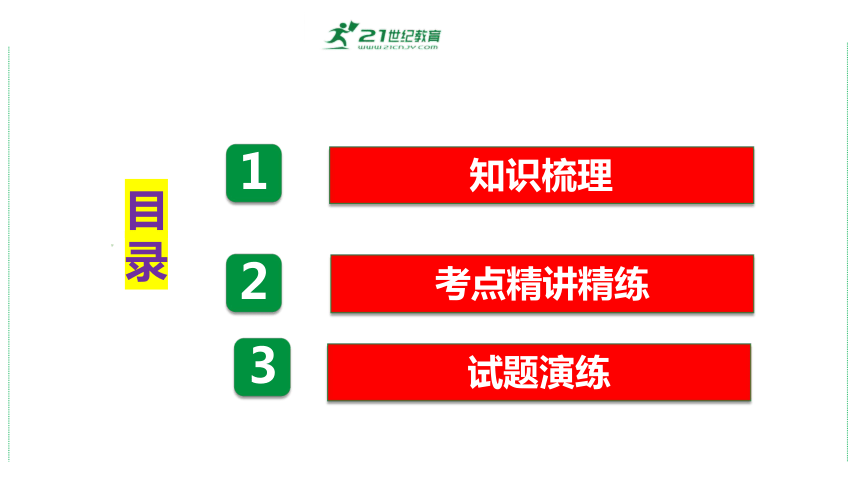
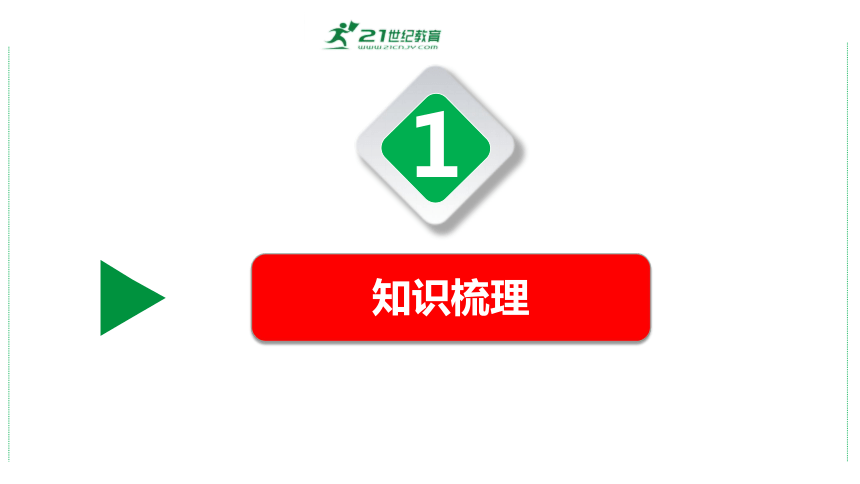
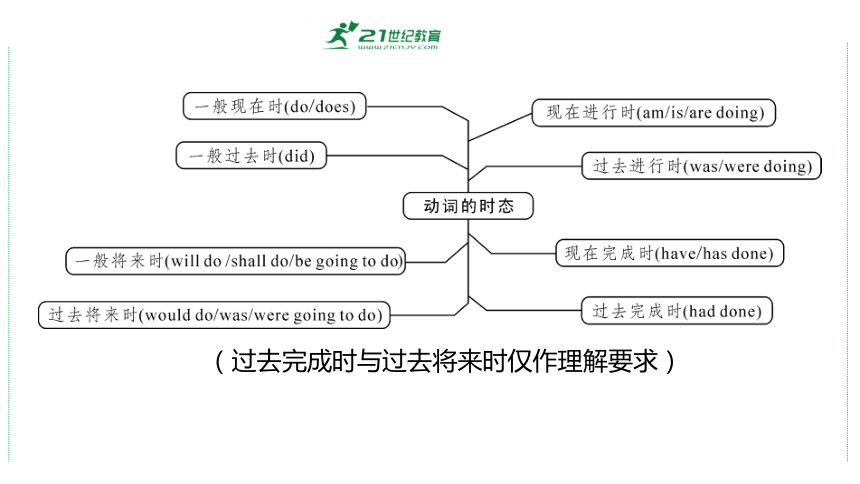

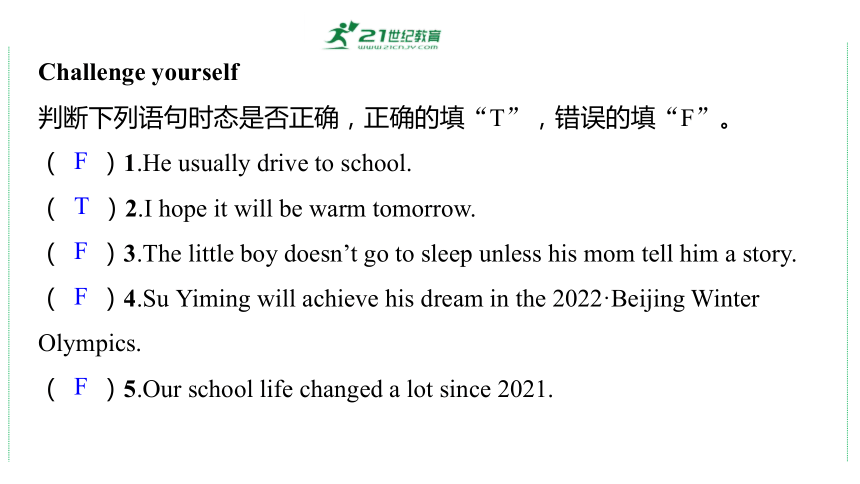
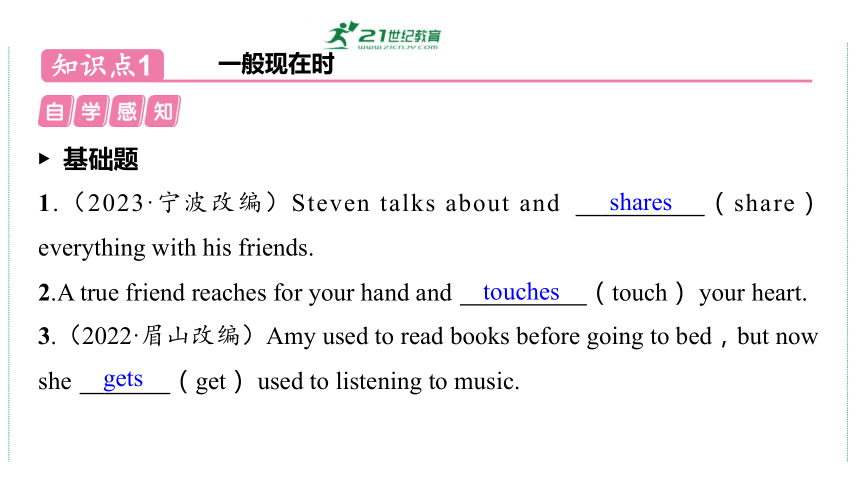
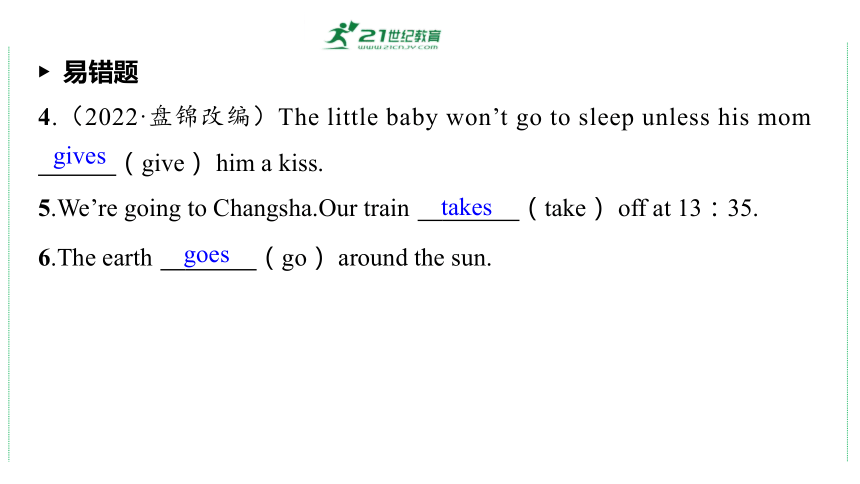
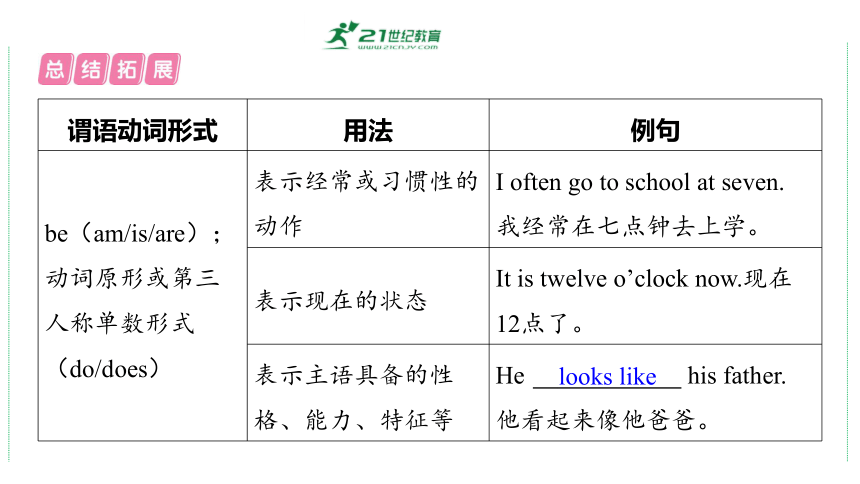
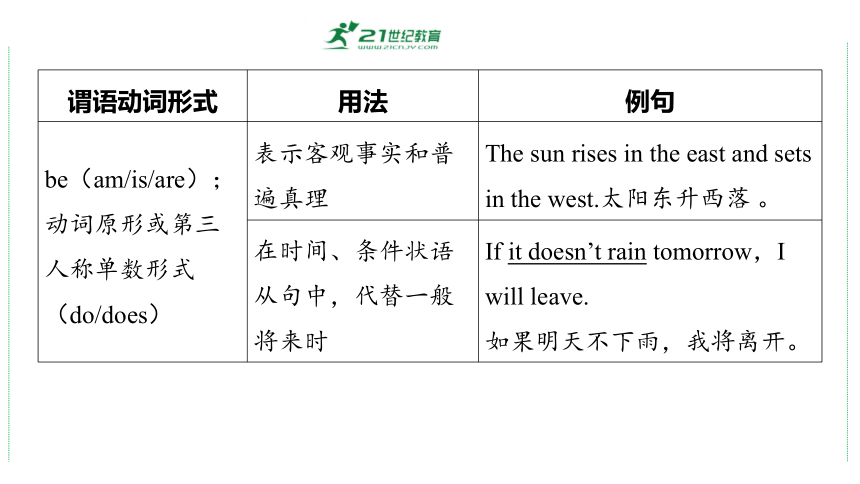
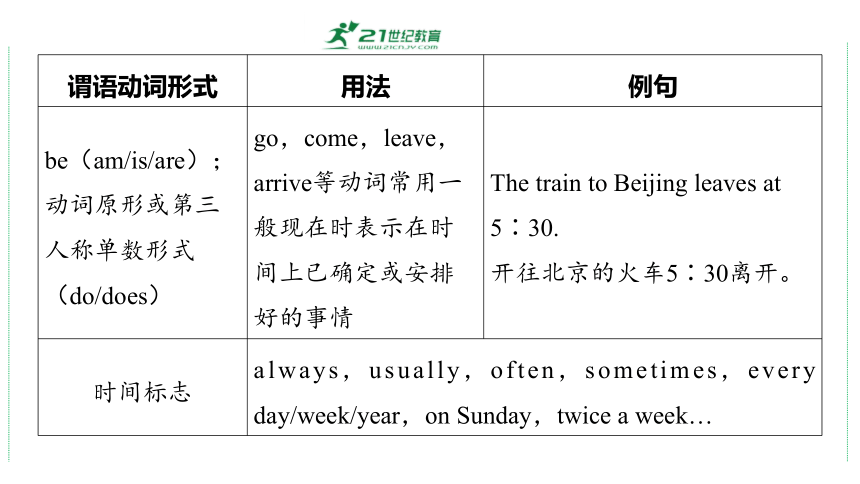
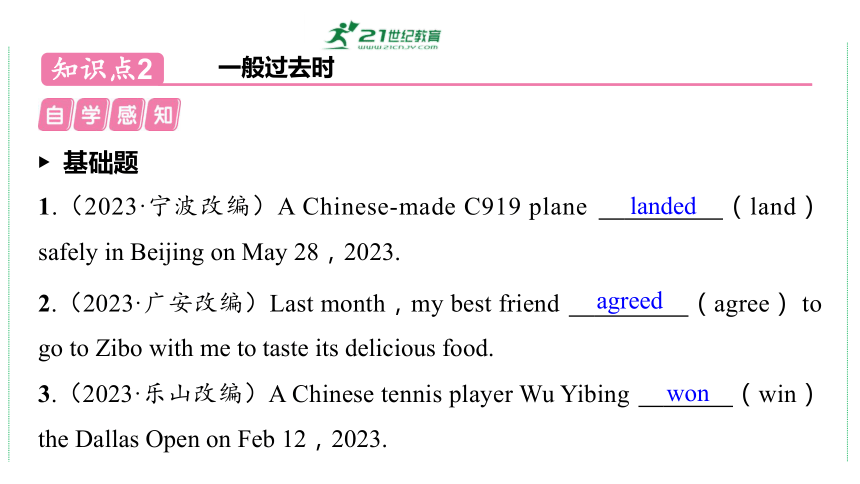
文档简介
(共45张PPT)
专题十 动词的时态
中考英语二轮复习语法梳理
目
录
1
知识梳理
2
考点精讲精练
3
试题演练
1
知识梳理
(过去完成时与过去将来时仅作理解要求)
2
考点精讲精练
Challenge yourself
判断下列语句时态是否正确,正确的填“T”,错误的填“F”。
( F )1.He usually drive to school.
( T )2.I hope it will be warm tomorrow.
( F )3.The little boy doesn’t go to sleep unless his mom tell him a story.
( F )4.Su Yiming will achieve his dream in the 2022·Beijing Winter Olympics.
( F )5.Our school life changed a lot since 2021.
F
T
F
F
F
一般现在时
知识点1
基础题
1.(2023·宁波改编)Steven talks about and shares (share) everything with his friends.
2.A true friend reaches for your hand and touches (touch) your heart.
3.(2022·眉山改编)Amy used to read books before going to bed,but now she gets (get) used to listening to music.
shares
touches
gets
易错题
4.(2022·盘锦改编)The little baby won’t go to sleep unless his mom gives (give) him a kiss.
5.We’re going to Changsha.Our train takes (take) off at 13:35.
gives
takes
6.The earth goes (go) around the sun.
goes
谓语动词形式 用法 例句
be(am/is/are);动词原形或第三人称单数形式(do/does) 表示经常或习惯性的动作 I often go to school at seven.
我经常在七点钟去上学。
表示现在的状态 It is twelve o’clock now.现在12点了。
表示主语具备的性格、能力、特征等 He looks like his father.
他看起来像他爸爸。
looks like
谓语动词形式 用法 例句
be(am/is/are);动词原形或第三人称单数形式(do/does) 表示客观事实和普遍真理 The sun rises in the east and sets in the west.太阳东升西落 。
在时间、条件状语从句中,代替一般将来时 If it doesn’t rain tomorrow,I will leave.
如果明天不下雨,我将离开。
谓语动词形式 用法 例句
be(am/is/are);动词原形或第三人称单数形式(do/does) go,come,leave,arrive等动词常用一般现在时表示在时间上已确定或安排好的事情 The train to Beijing leaves at 5∶30.
开往北京的火车5∶30离开。
时间标志 always,usually,often,sometimes,every day/week/year,on Sunday,twice a week… 一般过去时
知识点2
基础题
1.(2023·宁波改编)A Chinese-made C919 plane landed (land) safely in Beijing on May 28,2023.
landed
2.(2023·广安改编)Last month,my best friend agreed (agree) to go to Zibo with me to taste its delicious food.
3.(2023·乐山改编)A Chinese tennis player Wu Yibing won (win) the Dallas Open on Feb 12,2023.
agreed
won
4.(2022·杭州)My deskmate caught (catch) the school bus this morning,but I missed it and was late for school.
5.(2022·百色)To avoid getting together,our school held (hold) a parents’ meeting online last week.
caught
held
易错题
6.Yuan Longping,“Father of Hybrid(杂交) Rice”, was born in Beijing.
7.In 1974,he and his team succeeded (succeed) in developing a set of technologies for producing hybrid rice.
8.Zheng He was (be) a Ming Dynasty explorer that we Chinese people are proud of.
was born
succeeded
was
谓语动词形式 用法 例句
be(was/were);动词的过去式(did) 表示过去某个时间里发生的动作或存在的状态 I met him in the street yesterday.
昨天我在街上遇见他了。
谓语动词形式 用法 例句
be(was/were);动词的过去式(did) 表示过去习惯性、经常性的动作、行为,常和often,always等频度副词连用 He often went to school by bus last term.
上学期他经常乘公共汽车去上学。
时间标志 yesterday,the day before yesterday,last night/week/year,a moment ago,just now,then,in 2000,when he was very young… “used to+动词原形”表示过去的习惯或状态。如:He used to be shy.他过去害羞。
一般将来时
知识点3
基础题
1.(2022·宿迁)When I have difficulty in making a choice,Mr.Wu will offer (offer) me some suggestions.
2.(2022·无锡)In the coming summer vacation,I will attend (attend) a DIY course.
3.(2022·北京改编)Don’t lose heart.If you keep working hard,you will succeed (succeed) some day.
will
offer
will attend
will
succeed
易错题
4.Boys and girls,join in the cooking club,and you will develop (develop)some basic life skills.
5.Hurry up,Harry.Our friends will arrive (arrive) in half an hour.
6.Don’t worry.Hobo is a smart dog and I’m sure he will come (come) back soon.
will develop
will arrive
will come
谓语动词形式 用法 例句
will/shall+动词原形(shall用于第一人称);be(am/is/are)going to+动词原形 表示将来某个时间将要发生的动作或存在的状态 My friends will go to America in two days.
两天后我的朋友们将去美国。
Look! It’s going to rain.瞧!要下雨了。
will go
going to
谓语动词形式 用法 例句
will/shall+动词原形(shall用于第一人称);be(am/is/are)going to+动词原形 表示按计划、打算要做的事,多用be going to I am going to climb the mountain this afternoon.
今天下午我打算去爬山。
时间标志 tomorrow,next week/month/year,in a few days(in+时间段),in the future,from now on,soon… am going to
be going to与will的区别
1.be going to 指已计划好的事或思考过的意图、打算,will表示未事先思考或未计划而临时做出的决定。如:
I’m going to see him tomorrow.我打算明天去看他。(事先经过思考)
I’ll answer the door.我去开门。(未经事先考虑)
2.be going to可表示客观迹象表明马上要发生的事,而will则表明说话者的主观意愿。如:
Look at the clouds.There is going to be a storm.
看看这些云,暴风雨就要来了。(客观迹象表明要发生)
I hope it will be warm tomorrow.我希望明天会暖和起来。(主观意愿)
3.在含有条件状语从句的复合句的主句中,一般用will,不用 be going to。 如:
I will come if it doesn’t rain.如果不下雨的话,我就来。
现在进行时
知识点4
基础题
1.(2022·重庆改编)—Excuse me,what is Nick doing?
—Look!He is watering (water) flowers outside.
2.(2022·北京改编)The workers are cleaning (clean) the community center now.
is watering
are cleaning
3.(2022·甘肃改编)We are having (have) a e and join in.
4.(2022·德阳)Be quiet! Your father is sleeping (sleep).He stayed up late last night.
are having
is sleeping
易错题
5.(2022·扬州)Excuse me,what problems are we really trying (try) to solve?
6.The findings of an international team of scientists show that our climate is getting (get) warmer and warmer.
trying
is
getting
谓语动词形式 用法 例句
am/is/are +现在分词(doing) 表示说话时正在进行的动作 They are watching TV now.他们正在看电视。
[see,hear等表示感官的动词 一般不用现在进行时 ]
一般不用现在进行时
谓语动词形式 用法 例句
am/is/are +现在分词(doing) 表示当前一段时间内的活动或现阶段正在进行的动作(常与these days等连用) These days we’re working on the farm.
这些天我们在农场干活。
与always,forever等词连用表示赞扬、厌恶或不满等情感 Alice is always thinking of others.
艾丽斯总是想着别人。
谓语动词形式 用法 例句
am/is/are +现在分词(doing) 表示位置移动的动词,如come,go,leave,arrive等常用现在进行时表示最近 即将发生 的动作 I’m coming.我这就来。
We are leaving tomorrow.我们明天将离开。
时间标志 now,“Look!”,“Listen!”,at the/this moment… 即将发生
are leaving
过去进行时
知识点5
基础题
1.(2022·无锡)—Why didn’t you reply to my WeChat?
—Sorry.I was helping (help) my neighbour look after her baby.
2.(2022·河北改编) At this time yesterday,I was taking (take) a science exam here.
was helping
was taking
3.(2022·北京改编)I was thinking (think) about my sister when my phone rang.It was her!
was thinking
4.(2022·镇江改编)—You look tired!
—My husband was watching (watch) football matches all night.That was too noisy!
was watching
易错题
5.I was taking (take) a walk at 8:00 yesterday evening.
6.They were having (have)dinner when I came in.
7.My sister had her finger cut while she was dividing (divide) the watermelon into pieces.
was taking
were having
was dividing
谓语动词形式 用法 例句
was/were +现在分词(doing) 表示过去某一时刻或某段时间 内正在进行的动作(动作发生的 时间常用一个短语或时间状语从句来表明) I was watching TV at eight o’clock last night.昨天晚上八点我正在看电视。
She was reading books all day last Saturday.上周六她一整天都在看书。
all
day
谓语动词形式 用法 例句
was/were +现在分词(doing) 与always,forever等词连用表示 赞扬、厌恶或不满等情感 He was forever complaining about something.他老是怨这怨那。
时间标志 at that time,at this time yesterday,at 9:00 last night,from nine to ten last night,when/while引导的时间状语从句等 现在完成时
知识点6
基础题
1.(2022·包头)My teacher has taught (teach) me to treat older people with respect in the past few years.
2.(2022·无锡)Fan Jinshi has done (do) a lot to protect Dunhuang culture for many years.
3.(2022·常德)We also look for ways to review what we have learnt/learned (learn) since three years ago.
has taught
has done
have
learnt/learned
4.—How do you get on with the English book?
—I’ve no idea.I have read (read) only half of it,and I’ll try to finish it at the weekend.
have read
5.Not only Paul but also his mother has visited (visit) many cities since they came to China.
has visited
易错题
6.(2022·苏州)Kate has painted (paint) her bedroom blue because the color brings peace to her mind and body.
7.A famous basketball player once said,“I have failed (fail) over and over again in my life and that is why I succeed.”
8.The city park has been (be) open for 4 years,but I have been (be) there only twice.
has painted
have failed
has been
have been
谓语动词形式 用法 例句
have/has + 过去分词 表示过去发生或完成的某一动作对现在造成的 影响或结果 I have seen the film already.
我已经看过这部电影了。(已知电影内容)
影
响或结果
have seen
谓语动词形式 用法 例句
have/has + 过去分词 表示过去开始的动作或状态,一直持续到现在乃至将来(谓语常用 延续性 动词,与so far,since/for …连用) I have studied in the school since 2019.
自从2019年我就在这所学校学习。
时间标志 already,just,yet,so far,up to now,ever,since then,in/during the past…years,“since+过去时间点”,“since+一般过去时从句”,“for+时间段”… 延续
性
have studied
1.have/has been to,have/has gone to与have/has been in
(讲解详见八下Units 9—10 知识点2)
2.延续性动词与非延续性动词
英语中的动词按动作发生的方式、发生过程的长短可分为延续性动词和非延续性动词两种,非延续性动词也可称为短暂性动词或瞬间动词。在现在完成时态中,有时要将非延续性动词转换为延续性动词,这样才能和时间段连用。
3.现在完成时与一般过去时的区别
现在完成时强调某一动作或状态对现在造成的影响或结果,不能和表示过去的时间状语连用;一般过去时只表示过去的事实,不表示和现在的关系,可以和表示过去的时间状语连用。如:
I bought a ticket yesterday.我昨天买了一张票。
(强调我昨天做的一件事是买票)
I have already bought a ticket.我已经买了一张票。
(强调我已经有票了,无需再惦记票的事了)
3
试题演练
根据语境,用所给词的适当形式填空。
1.(2023·四川泸州改编)—Which teacher will you miss the most after graduation
—Mrs.Chen.She encouraged me a lot when I (fail) the English exam.
2.(2023·江西改编)I’ve just got two tickets! I (go) to see the new movie with Tony.
3.(2023·山东滨州改编)—Sorry,I can’t hear you clearly. I (watch) a football match.
—OK.I’ll ring you up later.
failed
will go
am watching
4.(2023·四川达州改编)—Jack,could you please help me take out the trash
—Sorry,I (can),mom. I (do) my homework now.
5.I know that learning at school (make) us better persons.
6.Chinese (greet) each other by shaking hands while Japanese bow.
7.My father (work) in a factory two years ago,and now he is a successful businessman.
8.Edward and Jill (go) Beijing this weekend,so they have to finish their homework by Friday.
can’t
am doing
makes
greet
worked
are going to
9.Some students (play) Taiji over there. Let’s go and join them.
10.When my friend called me yesterday. I (help) my mom in the kitchen.
11.Rex did not feel the earthquake this morning. He (jog) in the park at the time.
12.—Becky, we’re leaving in several minutes. Are you ready
—No,I (pack) my clothes yet.
are playing
was helping
was jogging
haven’t packed
13.— (Have) you (hear) about Naxi Ancient Music yet
—Yes,I have.It is a part of Naxi culture.
14.Mom is a teacher.She (teach) English for eighteen years.
15.This book must be great.My sister (read) it five times.
Have
heard
has taught
has read
专题十 动词的时态
中考英语二轮复习语法梳理
目
录
1
知识梳理
2
考点精讲精练
3
试题演练
1
知识梳理
(过去完成时与过去将来时仅作理解要求)
2
考点精讲精练
Challenge yourself
判断下列语句时态是否正确,正确的填“T”,错误的填“F”。
( F )1.He usually drive to school.
( T )2.I hope it will be warm tomorrow.
( F )3.The little boy doesn’t go to sleep unless his mom tell him a story.
( F )4.Su Yiming will achieve his dream in the 2022·Beijing Winter Olympics.
( F )5.Our school life changed a lot since 2021.
F
T
F
F
F
一般现在时
知识点1
基础题
1.(2023·宁波改编)Steven talks about and shares (share) everything with his friends.
2.A true friend reaches for your hand and touches (touch) your heart.
3.(2022·眉山改编)Amy used to read books before going to bed,but now she gets (get) used to listening to music.
shares
touches
gets
易错题
4.(2022·盘锦改编)The little baby won’t go to sleep unless his mom gives (give) him a kiss.
5.We’re going to Changsha.Our train takes (take) off at 13:35.
gives
takes
6.The earth goes (go) around the sun.
goes
谓语动词形式 用法 例句
be(am/is/are);动词原形或第三人称单数形式(do/does) 表示经常或习惯性的动作 I often go to school at seven.
我经常在七点钟去上学。
表示现在的状态 It is twelve o’clock now.现在12点了。
表示主语具备的性格、能力、特征等 He looks like his father.
他看起来像他爸爸。
looks like
谓语动词形式 用法 例句
be(am/is/are);动词原形或第三人称单数形式(do/does) 表示客观事实和普遍真理 The sun rises in the east and sets in the west.太阳东升西落 。
在时间、条件状语从句中,代替一般将来时 If it doesn’t rain tomorrow,I will leave.
如果明天不下雨,我将离开。
谓语动词形式 用法 例句
be(am/is/are);动词原形或第三人称单数形式(do/does) go,come,leave,arrive等动词常用一般现在时表示在时间上已确定或安排好的事情 The train to Beijing leaves at 5∶30.
开往北京的火车5∶30离开。
时间标志 always,usually,often,sometimes,every day/week/year,on Sunday,twice a week… 一般过去时
知识点2
基础题
1.(2023·宁波改编)A Chinese-made C919 plane landed (land) safely in Beijing on May 28,2023.
landed
2.(2023·广安改编)Last month,my best friend agreed (agree) to go to Zibo with me to taste its delicious food.
3.(2023·乐山改编)A Chinese tennis player Wu Yibing won (win) the Dallas Open on Feb 12,2023.
agreed
won
4.(2022·杭州)My deskmate caught (catch) the school bus this morning,but I missed it and was late for school.
5.(2022·百色)To avoid getting together,our school held (hold) a parents’ meeting online last week.
caught
held
易错题
6.Yuan Longping,“Father of Hybrid(杂交) Rice”, was born in Beijing.
7.In 1974,he and his team succeeded (succeed) in developing a set of technologies for producing hybrid rice.
8.Zheng He was (be) a Ming Dynasty explorer that we Chinese people are proud of.
was born
succeeded
was
谓语动词形式 用法 例句
be(was/were);动词的过去式(did) 表示过去某个时间里发生的动作或存在的状态 I met him in the street yesterday.
昨天我在街上遇见他了。
谓语动词形式 用法 例句
be(was/were);动词的过去式(did) 表示过去习惯性、经常性的动作、行为,常和often,always等频度副词连用 He often went to school by bus last term.
上学期他经常乘公共汽车去上学。
时间标志 yesterday,the day before yesterday,last night/week/year,a moment ago,just now,then,in 2000,when he was very young… “used to+动词原形”表示过去的习惯或状态。如:He used to be shy.他过去害羞。
一般将来时
知识点3
基础题
1.(2022·宿迁)When I have difficulty in making a choice,Mr.Wu will offer (offer) me some suggestions.
2.(2022·无锡)In the coming summer vacation,I will attend (attend) a DIY course.
3.(2022·北京改编)Don’t lose heart.If you keep working hard,you will succeed (succeed) some day.
will
offer
will attend
will
succeed
易错题
4.Boys and girls,join in the cooking club,and you will develop (develop)some basic life skills.
5.Hurry up,Harry.Our friends will arrive (arrive) in half an hour.
6.Don’t worry.Hobo is a smart dog and I’m sure he will come (come) back soon.
will develop
will arrive
will come
谓语动词形式 用法 例句
will/shall+动词原形(shall用于第一人称);be(am/is/are)going to+动词原形 表示将来某个时间将要发生的动作或存在的状态 My friends will go to America in two days.
两天后我的朋友们将去美国。
Look! It’s going to rain.瞧!要下雨了。
will go
going to
谓语动词形式 用法 例句
will/shall+动词原形(shall用于第一人称);be(am/is/are)going to+动词原形 表示按计划、打算要做的事,多用be going to I am going to climb the mountain this afternoon.
今天下午我打算去爬山。
时间标志 tomorrow,next week/month/year,in a few days(in+时间段),in the future,from now on,soon… am going to
be going to与will的区别
1.be going to 指已计划好的事或思考过的意图、打算,will表示未事先思考或未计划而临时做出的决定。如:
I’m going to see him tomorrow.我打算明天去看他。(事先经过思考)
I’ll answer the door.我去开门。(未经事先考虑)
2.be going to可表示客观迹象表明马上要发生的事,而will则表明说话者的主观意愿。如:
Look at the clouds.There is going to be a storm.
看看这些云,暴风雨就要来了。(客观迹象表明要发生)
I hope it will be warm tomorrow.我希望明天会暖和起来。(主观意愿)
3.在含有条件状语从句的复合句的主句中,一般用will,不用 be going to。 如:
I will come if it doesn’t rain.如果不下雨的话,我就来。
现在进行时
知识点4
基础题
1.(2022·重庆改编)—Excuse me,what is Nick doing?
—Look!He is watering (water) flowers outside.
2.(2022·北京改编)The workers are cleaning (clean) the community center now.
is watering
are cleaning
3.(2022·甘肃改编)We are having (have) a e and join in.
4.(2022·德阳)Be quiet! Your father is sleeping (sleep).He stayed up late last night.
are having
is sleeping
易错题
5.(2022·扬州)Excuse me,what problems are we really trying (try) to solve?
6.The findings of an international team of scientists show that our climate is getting (get) warmer and warmer.
trying
is
getting
谓语动词形式 用法 例句
am/is/are +现在分词(doing) 表示说话时正在进行的动作 They are watching TV now.他们正在看电视。
[see,hear等表示感官的动词 一般不用现在进行时 ]
一般不用现在进行时
谓语动词形式 用法 例句
am/is/are +现在分词(doing) 表示当前一段时间内的活动或现阶段正在进行的动作(常与these days等连用) These days we’re working on the farm.
这些天我们在农场干活。
与always,forever等词连用表示赞扬、厌恶或不满等情感 Alice is always thinking of others.
艾丽斯总是想着别人。
谓语动词形式 用法 例句
am/is/are +现在分词(doing) 表示位置移动的动词,如come,go,leave,arrive等常用现在进行时表示最近 即将发生 的动作 I’m coming.我这就来。
We are leaving tomorrow.我们明天将离开。
时间标志 now,“Look!”,“Listen!”,at the/this moment… 即将发生
are leaving
过去进行时
知识点5
基础题
1.(2022·无锡)—Why didn’t you reply to my WeChat?
—Sorry.I was helping (help) my neighbour look after her baby.
2.(2022·河北改编) At this time yesterday,I was taking (take) a science exam here.
was helping
was taking
3.(2022·北京改编)I was thinking (think) about my sister when my phone rang.It was her!
was thinking
4.(2022·镇江改编)—You look tired!
—My husband was watching (watch) football matches all night.That was too noisy!
was watching
易错题
5.I was taking (take) a walk at 8:00 yesterday evening.
6.They were having (have)dinner when I came in.
7.My sister had her finger cut while she was dividing (divide) the watermelon into pieces.
was taking
were having
was dividing
谓语动词形式 用法 例句
was/were +现在分词(doing) 表示过去某一时刻或某段时间 内正在进行的动作(动作发生的 时间常用一个短语或时间状语从句来表明) I was watching TV at eight o’clock last night.昨天晚上八点我正在看电视。
She was reading books all day last Saturday.上周六她一整天都在看书。
all
day
谓语动词形式 用法 例句
was/were +现在分词(doing) 与always,forever等词连用表示 赞扬、厌恶或不满等情感 He was forever complaining about something.他老是怨这怨那。
时间标志 at that time,at this time yesterday,at 9:00 last night,from nine to ten last night,when/while引导的时间状语从句等 现在完成时
知识点6
基础题
1.(2022·包头)My teacher has taught (teach) me to treat older people with respect in the past few years.
2.(2022·无锡)Fan Jinshi has done (do) a lot to protect Dunhuang culture for many years.
3.(2022·常德)We also look for ways to review what we have learnt/learned (learn) since three years ago.
has taught
has done
have
learnt/learned
4.—How do you get on with the English book?
—I’ve no idea.I have read (read) only half of it,and I’ll try to finish it at the weekend.
have read
5.Not only Paul but also his mother has visited (visit) many cities since they came to China.
has visited
易错题
6.(2022·苏州)Kate has painted (paint) her bedroom blue because the color brings peace to her mind and body.
7.A famous basketball player once said,“I have failed (fail) over and over again in my life and that is why I succeed.”
8.The city park has been (be) open for 4 years,but I have been (be) there only twice.
has painted
have failed
has been
have been
谓语动词形式 用法 例句
have/has + 过去分词 表示过去发生或完成的某一动作对现在造成的 影响或结果 I have seen the film already.
我已经看过这部电影了。(已知电影内容)
影
响或结果
have seen
谓语动词形式 用法 例句
have/has + 过去分词 表示过去开始的动作或状态,一直持续到现在乃至将来(谓语常用 延续性 动词,与so far,since/for …连用) I have studied in the school since 2019.
自从2019年我就在这所学校学习。
时间标志 already,just,yet,so far,up to now,ever,since then,in/during the past…years,“since+过去时间点”,“since+一般过去时从句”,“for+时间段”… 延续
性
have studied
1.have/has been to,have/has gone to与have/has been in
(讲解详见八下Units 9—10 知识点2)
2.延续性动词与非延续性动词
英语中的动词按动作发生的方式、发生过程的长短可分为延续性动词和非延续性动词两种,非延续性动词也可称为短暂性动词或瞬间动词。在现在完成时态中,有时要将非延续性动词转换为延续性动词,这样才能和时间段连用。
3.现在完成时与一般过去时的区别
现在完成时强调某一动作或状态对现在造成的影响或结果,不能和表示过去的时间状语连用;一般过去时只表示过去的事实,不表示和现在的关系,可以和表示过去的时间状语连用。如:
I bought a ticket yesterday.我昨天买了一张票。
(强调我昨天做的一件事是买票)
I have already bought a ticket.我已经买了一张票。
(强调我已经有票了,无需再惦记票的事了)
3
试题演练
根据语境,用所给词的适当形式填空。
1.(2023·四川泸州改编)—Which teacher will you miss the most after graduation
—Mrs.Chen.She encouraged me a lot when I (fail) the English exam.
2.(2023·江西改编)I’ve just got two tickets! I (go) to see the new movie with Tony.
3.(2023·山东滨州改编)—Sorry,I can’t hear you clearly. I (watch) a football match.
—OK.I’ll ring you up later.
failed
will go
am watching
4.(2023·四川达州改编)—Jack,could you please help me take out the trash
—Sorry,I (can),mom. I (do) my homework now.
5.I know that learning at school (make) us better persons.
6.Chinese (greet) each other by shaking hands while Japanese bow.
7.My father (work) in a factory two years ago,and now he is a successful businessman.
8.Edward and Jill (go) Beijing this weekend,so they have to finish their homework by Friday.
can’t
am doing
makes
greet
worked
are going to
9.Some students (play) Taiji over there. Let’s go and join them.
10.When my friend called me yesterday. I (help) my mom in the kitchen.
11.Rex did not feel the earthquake this morning. He (jog) in the park at the time.
12.—Becky, we’re leaving in several minutes. Are you ready
—No,I (pack) my clothes yet.
are playing
was helping
was jogging
haven’t packed
13.— (Have) you (hear) about Naxi Ancient Music yet
—Yes,I have.It is a part of Naxi culture.
14.Mom is a teacher.She (teach) English for eighteen years.
15.This book must be great.My sister (read) it five times.
Have
heard
has taught
has read
同课章节目录
- 词法
- 名词
- 动词和动词短语
- 动词语态
- 动词时态
- 助动词和情态动词
- 非谓语动词
- 冠词
- 代词
- 数词和量词
- 形容词副词及其比较等级
- 介词和介词短语
- 连词和感叹词
- 构词法
- 相似、相近词比较
- 句法
- 陈述句
- 一般疑问句和否定疑问句
- 特殊疑问句及选择疑问句
- 反意疑问句
- 存在句(There be句型)
- 宾语从句
- 定语从句
- 状语从句
- 主谓一致问题
- 简单句
- 并列句
- 复合句
- 主谓一致
- 主、表语从句
- 名词性从句
- 直接引语和间接引语
- 虚拟语气
- 感叹句
- 强调句
- 倒装句
- 祈使句
- 句子的成分
- 句子的分类
- 题型专区
- 单项选择部分
- 易错题
- 完形填空
- 阅读理解
- 词汇练习
- 听说训练
- 句型转换
- 补全对话
- 短文改错
- 翻译
- 书面表达
- 任务型阅读
- 语法填空
- 其他资料
